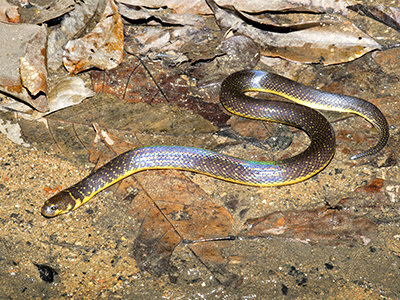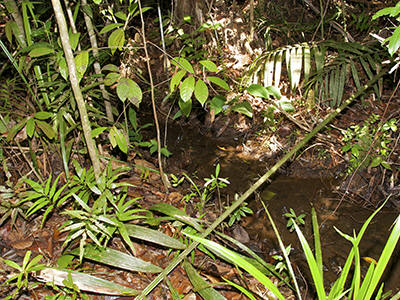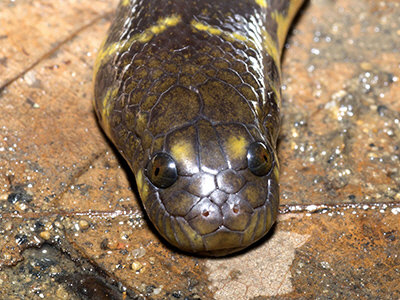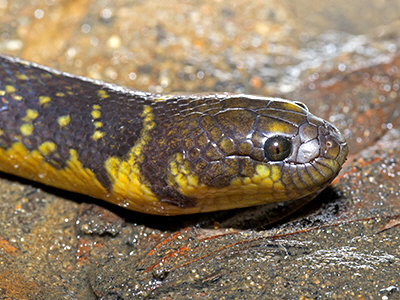
Fig 1

Fig 2

Fig 3

Fig 4
|
Family : HOMALOPSIDAE
Species : Phytolopsis punctata
Maximum Size : 73 cm
The Blackwater Mud Snake,
or Spotted Water Snake, is a secretive species which inhabits muddy or silty
streams and shallow ponds in lowland, freshwater swamp forest or peat swamp
habitat. The term 'blackwater' is used to describe slow-moving, acidic,
tannin-stained streams and rivers which flow through such areas.
Despite its rather unattractive name, this snake is a rich brown to greyish
black in colour, patterned with thin, broken, bright yellow bands on the
anterior part of the body. There is a thin yellow band between the eyes,
and numerous small yellow spots throughout the rest of the body and tail.
The belly is also bright yellow.
The head is of the same width as the body and slightly flattened, and the
body is cylindrical in cross-section : both features imply that it likes to
burrow in soft mud. The tail is short and quickly tapers.
The eyes are small and are situated on top of the head, as are the nostrils,
and both features are typical of well-adapted, aquatic snakes.
The species probably feeds mainly on fishes. A recent specimen from
Singapore was found with a 13 cm
Forest Walking Catfish in
its gut (Tan et al, 2014).
The scientific name of this species has come full circle. For a century it
was assigned to the genus Enhydris, but in 2014 was reassigned to the
genus Phytolopsis (Murphy et al, 2014) under which it was
first described in 1849.
It has long been known to occur in Peninsular Malaysia, Sumatra and Borneo.
In 2014 it was found for the first time in Singapore in an area of
freshwater swamp forest (Thomas et al, 2014). The wide geographical range of
this species may conceal a complex of similar looking species.
Fig 1 : Specimen from Singapore, measuring 41
cm total length.
Fig 2 : Typical 'blackwater' stream in lowland swamp forest in Singapore.
Figs 3 and 4 : Close-ups of the same specimen as in Fig 1, which shows
typical patterning and scalation for the species.
References :
Das, I., 2010. A Field Guide to the Reptiles of South-east Asia. New Holland
Publishers (UK) Ltd.
Murphy, J.C. & Voris, H.K. 2014. A Checklist and
Key to the Homalopsid Snakes (Reptilia, Squamata, Serpentes), with the
Description of New Genera. Fieldiana: Life and Earth Sciences
(8): 1–43
Tan, H. H., Li, T. J., Lim, W. H. 2014. A food item of the blackwater mud
snake. Singapore Biodiversity Records. Lee Kong Chian Natural History
Museum. 2014 : 311-32.
Thomas, N., Li, T. J., Lim, W. H., Cai, Y., X. 2014. New record of the
blackwater mud snake in Singapore. Singapore Biodiversity Records.
Lee Kong Chian Natural History Museum. 2014 : 309-310.
Thanks to Noel Thomas and Kelvin Lim for
assistance
|